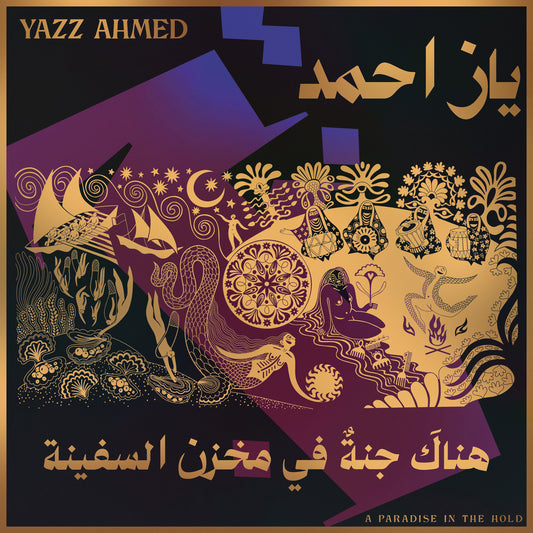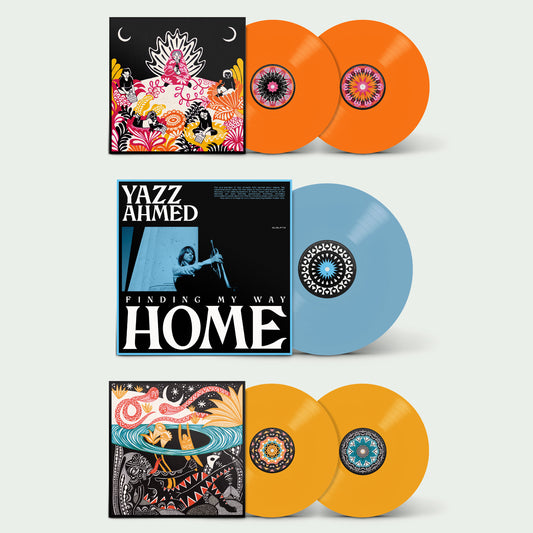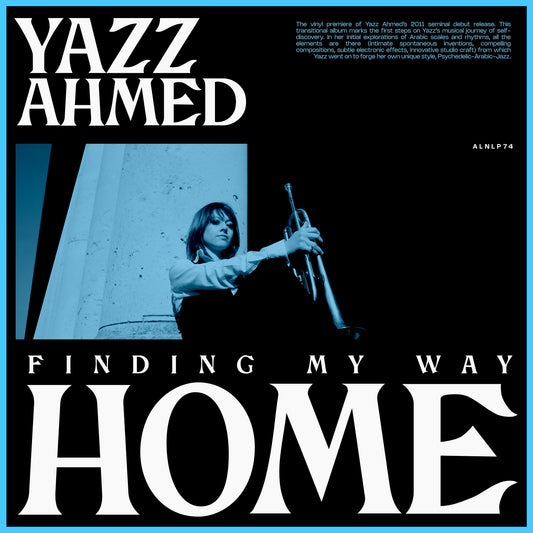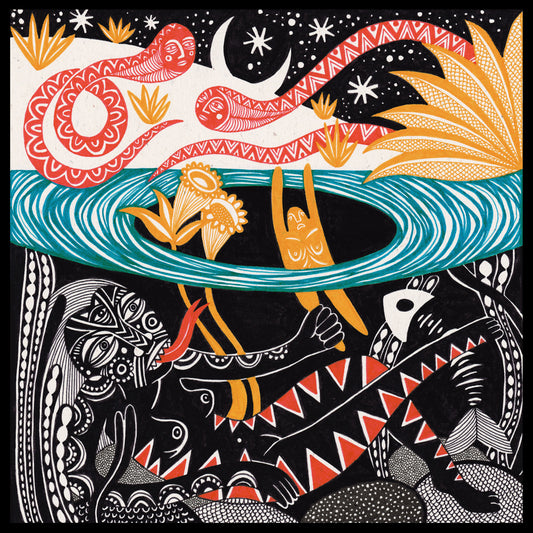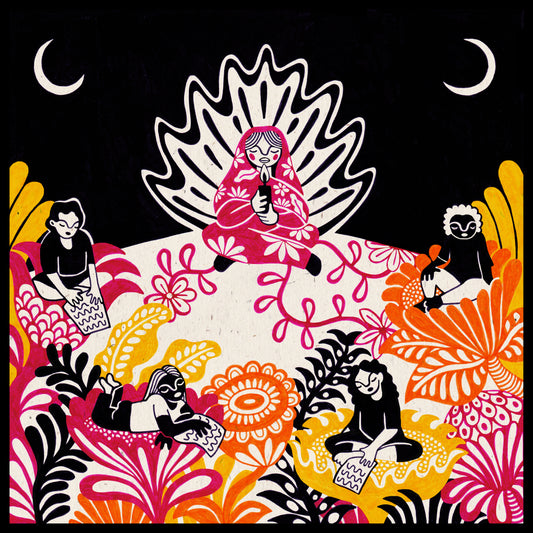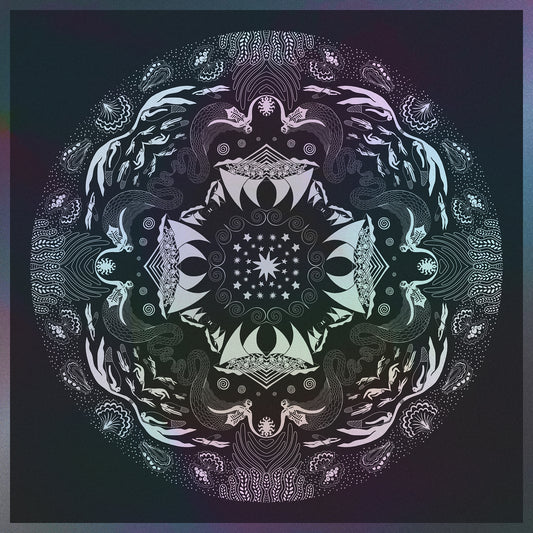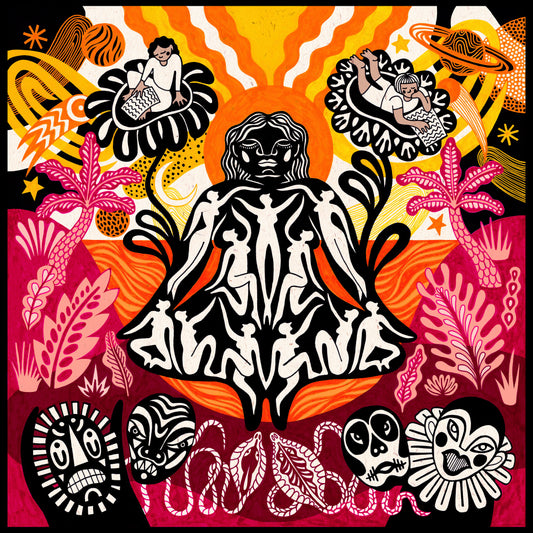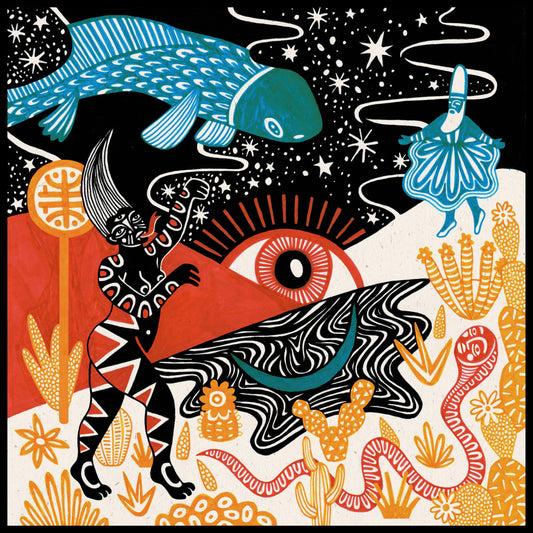Yazz Ahmed
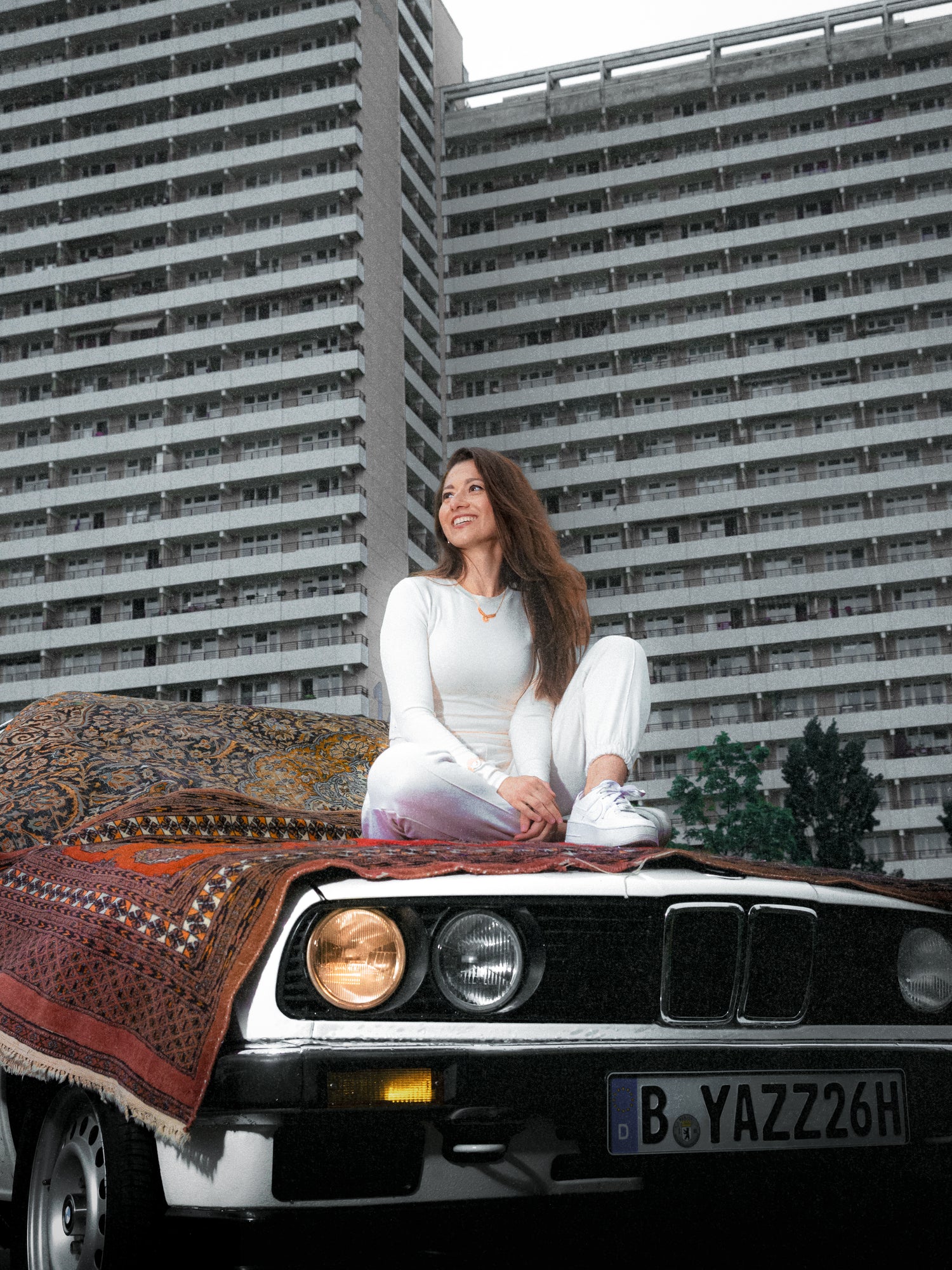
RELEASES
Yazz Ahmed, hailed as one of the most influential trumpet players of her generation. An Ivor Novello award winning composer who makes sweeping epics that are rich with storytelling, depicting evocative ancient worlds and mythological muses. With her fourth studio album, A Paradise in the Hold, the British-Bahrani musician dives even deeper into her dual heritage and has come up with a treasure trove that draws on traditional music and stories from her childhood home. Ahmed writes for the voice for the first time, with lyrics inspired by Bahraini wedding poems and the yearning songs of the pearl divers. Deeply textural, expansive and full of potent performances, the album charts the heroic voyages of the jewel-hunters of yore, who sailed home through rough seas with precious cargo, and Ahmed’s own voyage of self-discovery over the past decade.
“A thread in my work has been searching for, establishing and, now, finally embracing and celebrating my cultural identity,” she says. Whereas she explored Arabian music more generally with her earlier material, this release is more explicitly linked to her homeland. “If my first album, 2011’s Finding My Way Home, represents the first steps on this path then with A Paradise In The Hold, I’ve arrived at a deeper understanding of how my British and Bahraini heritage can co-exist, in personal as well as musical terms.”
Ahmed began A Paradise in the Hold’s journey back in 2014, on a research trip in Bahrain, during her Jazzlines Fellowship. She’d trawl local bookshops looking for poems and lyrical inspiration. Many came from wedding songs, which were “a lot about beauty and connecting beauty with nature,” she says. Deepening her connection to the tradition, her grandfather even sang her some songs from his own wedding day. At the same time, she became fascinated by the celebratory music of women’s drumming circles and how they contrasted the work songs of the pearl divers. The latter dangerous pursuit has since ceased, though the divers’ sorrowful music – sung and clapped in a polyrhythmic style known as fijiri – lives on.
“They were songs that encouraged the fishermen to stay in good spirits, or songs about missing your loved ones,” says Ahmed. Some of the former pearl divers have formed choirs that tour around the Gulf and she caught a performance by the Pearl Divers of Muharraq, the name of her former hometown. “It gave me an opportunity to connect on a deeper level with the music that I grew up with as a child, but didn’t really embrace at the time.”
Ahmed grew up in Bahrain until the age of nine and lived there during the Gulf War in the early 90s. While she has happy memories of her childhood, many were overshadowed by conflict, like “having a gas mask and not being able to go to school. We went to school in people’s garages,” she says. “I remember the sirens going off when there was a bomb threat, and closing the curtains, turning off all the lights, and covering the plughole in the bathtub so no poisonous gases could get in.”
She moved to London with her mother and sisters in 1992 but says, “I felt like I didn’t quite belong and I didn’t know why that was. For a long time, I would lie about my heritage because of how Arab and Muslim people were represented in American films and British dramas. When I was at school, I never said that I was half Bahraini.” Music, however, helped to strengthen her sense of identity. She saw links between the jazz she studied at university and Arabian classical music, and started to learn Arabic. “I started to rediscover my mixed heritage,” she adds. “And that’s when I started to remember all this music that I grew up hearing but never fully engaged with.”
The fruits of Ahmed’s 2014 research trip became a 90-minute suite, Alhaan Al Siduri, which she performed the following year in both the UK and Bahrain. It’s named for the character Siduri from folk tale the Epic of Gilgamesh: “a wise woman who lives on an island of absolute beauty, which some scholars have suggested may be Bahrain,” Ahmed explains.
She has reworked the suite’s main theme into album opener ‘She Stands On The Shore’, which sets the tone for an inky odyssey through mermaids, goddesses, sirens and, on ‘Dancing Barefoot’, a runaway bride; and love, loss, new beginnings and a newfound freedom.
Ahmed has always been drawn to stories of women in mythology – her last album, 2019’s Polyhymnia, was based on the Greek goddess of poetry and dance – but this time she has wider intentions. “I want to change the narrative about Arab women,” says Ahmed. “A lot of people think that Arab women are just oppressed. But in Bahrain there are plenty of creative women trying to do something different in the world.” Ahmed notes how Arabic music has been stereotypically used in western entertainment and she wanted to challenge that perception. “We hear it a lot in movies to represent the desert, or poor villagers,” she says, “but you rarely see it representing strong women, for example.”
Alhaan Al Siduri formed the basis of Ahmed’s album but it has evolved ambitiously over the following decade, during performances both solo and with orchestras. She expanded tracks with intricate sound design and added multiple trumpet parts. “I learned to think of them as antiphonal, so you can hear them from different angles,” she says. “And so it feels like you’re surrounded by this very majestic instrument.” The album’s texture, meanwhile, also stems from the field recordings she used to form loops and patterns, a technique Ahmed expanded upon with the track she made for US TV network Adult Swim’s jazz compilation New Jazz Century. On A Paradise in the Hold, ‘Dancing Barefoot’ is particularly exquisite, where vibraphonist Ralph Wyld played milk bottle tops and used cello bows made from coat hangers, “to conjure the feeling of a mind spiralling into a dream,” says Ahmed. Equally visceral, on ‘To The Lonely Sea’ collaborator Jason Singh created a “vocal sculpture” to echo the wind and waves.
Notably, Ahmed hadn’t written for the voice until now. For A Paradise In The Hold, she penned lyrics in English, which she then translated to Arabic, or, on ‘Though My Eyes Go To Sleep My Heart Does Not Forget You’, adapted the words from a pearl divers’ standard. She worked with a range of impressive singers to bring her vision to life: Brigitte Beraha, Natacha Atlas, Randolph Matthews and Alba Nacinovich. The voice of her father, meanwhile, can be heard on standout track ‘Into The Night’, which lands you in the centre of a percussive hubbub and which Ahmed intended as a celebration of female independence. “He was trying to conduct the recording session in the family house,” she says of her dad. “Everyone was gathered in the sitting room and I recorded some of the ululations and clapping that you can hear in the track. I’m so glad I got to have my family on the album.”
The collaborators on the album in particular, percussionist Corrina Silvester and the greatly missed giant of the jazz world and Yazz’s dear friend, drummer, Martin France, helped Ahmed to strengthen the connection between the two worlds; A Paradise In The Hold is a bold fusion that reveals its riches more with each rewarding listen. “It’s another step in my evolution of making music,” says Ahmed. “There’s so much beauty in Bahraini music. I hope this album gives people a flavour of how vibrant its culture is.”
